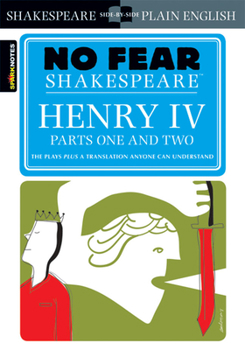Henry IV
Select Format
Select Condition 
Book Overview
Read Shakespeare's plays in all their brilliance--and understand what every word means
Don't be intimidated by Shakespeare These popular guides make the Bard's plays accessible and enjoyable. Each No Fear guide contains: The complete text of the original playA line-by-line translation that puts Shakespeare into everyday languageA complete list of characters with descriptionsPlenty of helpful commentaryFormat:Paperback
Language:English
ISBN:141140436X
ISBN13:9781411404366
Release Date:September 2005
Publisher:Sparknotes
Length:552 Pages
Weight:1.21 lbs.
Dimensions:1.4" x 5.3" x 7.4"
Age Range:12 to 15 years
Grade Range:Grades 7 to 10













